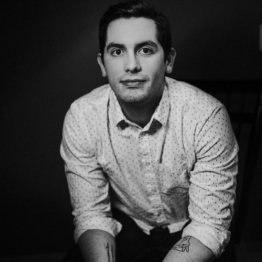Erinn Finley
Staff Writer
efinley@murraystate.edu
Assistant Professor of English T.J. Martinson, who began working in the Department of English and Philosophy this fall, brings the perspective of a published writer to the creative writing program.
Martinson received his doctorate in English from Indiana University in Bloomington, Indiana. His doctorate program also included a minor in literature and science.
“I was a literature focus, but even more specifically, postmodern literature,” Martinson said. “My dissertation was on metafiction, which is fiction about fiction.”
Martinson went on to explain that metafiction is self-aware fiction. The movie “Deadpool” is an example of this type of fiction because the titular character is aware he is in a movie.
Carrie Jerrell, associate professor of English and coordinator of the creative writing program, said Martinson was hired to fill one of two vacancies in the creative writing department.
Martinson wrote his dissertation on a book called ”The House of Leaves.” In his article, he said the novel models the scientific idea of epigenetics because of the author’s use of empty space.
Epigenetics refers to the idea that a mutation in the genetic code can be passed onto offspring. Martinson said researchers are looking for ways to model epigenetics.
“A lot of my research is what we would call formalist readings of novels,” Martinson said. “So looking at, literally, the form of it and how can we understand this form, what’s the value of this form, how might it help us explain, in my case, nonliterary things or scientific forms.”
Martinson wrote a novel titled “The Reign of the Kingfisher,” published in 2019. His book is about Kingfisher, a superhero, who is believed to be dead by the public. Martinson said he began writing the novel in 2015, when the Marvel Cinematic Universe was expanding, creating movies for every superhero.
“That fascinated me that superheroes were so firmly in the zeitgeist and I loved the idea of trying to contribute and write my own superhero,” Martinson said.
Martinson said it was challenging to write this story without immediately following the storyline most superhero stories use. He said he enjoyed trying to find a way to write a superhero narrative in a way that had not been done before.
Jerrell said what stood out about Martinson’s qualifications was that he had interests in both scholarship writing and his personal writing. His interests seemed to align well with students’ interests.
“It was clear to us in the interview process that he has an impressive breadth of knowledge when it comes to fiction and fiction writing, and so we felt like he would be a great candidate who could both help students understand the rich traditions of literary fiction, but also speak to the kinds of really contemporary subjects that they’re interested in,” Jerrell said.
Along with metafiction, Martinson said he also enjoys speculative fiction that draws from science fiction. He said the hallmark for this type of fiction seems to be that it examines real world issues by using science fiction. This lends a new perspective to common problems.
Martinson began teaching this fall. He is teaching Critical Reading, Writing and Inquiry; Introduction to Creative Writing and Introduction to Writing Fiction. In the spring, he will be teaching Critical Reading, Writing and Inquiry and Forms of Fiction.
Martinson brings a lot of energy and experience to the creative writing program, Jerrell said. She said a benefit Martinson brings is being a recently published author, which means he knows how the publishing industry works from a writer’s perspective and can share that knowledge with students.
Martinson said what he likes the most is just getting to know his students, getting a sense of what they are passionate about and helping them achieve their goals.
Martinson hopes to impart to students the belief that it is possible to become a writer and to care about the effect of their writing on the culture and world around them, he said.
“I think creative writing can often be taught in a cultural vacuum… and [they] don’t necessarily think about how it intersects with culture,” Martinson said. “But to really break that mold and to think about what decisions [you are] making in your writing and how [you can] be accountable to those decisions.”


























































































